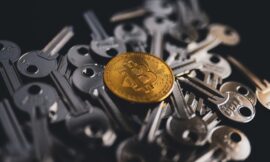What is a cryptocurrency wallet?
A cryptocurrency wallet is an app for interacting with cryptocurrencies on a blockchain. It can create and manage addresses for storing and transferring digital assets. It is an application with an interface and various functions to control the address and the crypto assets.
What is the public and private key in a cryptocurrency wallet?
When you create an address, the wallet generates keys – cryptographic identifiers, a kind of “ID” that you use to access the funds in your account (the address in the blockchain).
Each address usually has a pair of keys – a public key and a private key. They are linked to each other and are tied to a specific address.
The blockchain address is a ‘compressed’ version of the public key that any other user can view. The private key, on the other hand, is used to create digital signatures and verify transactions. It is known only to the owner of the address, as it gives access to their funds.
Keys are not needed to log in to the cryptocurrency vault; the username and password provided during registration are responsible for this.
Why do I need a seed-phrase?
Today, most wallets support another level of user authentication – with a seed-phrase. It’s a unique sequence of 12 or 24 words in English that serves as a password to regain access to an address or transfer it to another wallet.
Both the seed-phrase and the private key are strictly for the owner of the address; they cannot be given to anyone else. If the passphrase is lost or stolen, you cannot access your funds.
Can one crypto wallet be sufficient?
One user can have any number of addresses and wallets. Using a personal wallet and embedded cryptocurrency wallets in various applications, such as cryptocurrency exchanges, is common.
What is a custodial cryptocurrency wallet, and when is it needed?
A custodial wallet is a cryptocurrency storage and transfer application that features that its operator (the custodian) manages users’ addresses or has access to their private keys. In addition, custodial customers must undergo identity verification (KYC).
Centralized cryptocurrency exchanges have a built-in custodial wallet. Although each customer has a separate account and balance, all funds are stored in a small number of addresses managed by the exchange. It simplifies the handling of trading instruments and allows no transaction fees within the platform.
Individual clients rarely encounter custodial wallets outside of dedicated applications. However, such solutions are often used by institutional investors – companies that operate with large sums of money. They outsource cryptocurrencies to a professional company with increased security and other services, such as insurance. Notable custodians include Xapo, BitGo, Gemini, and Coinbase Custody.
What are the disadvantages of cryptocurrency custodians?
The main disadvantage of custodian cryptocurrencies is the ability of the custodian to gain access to customers’ crypto assets.
The exchange administration owns the private and public keys to the addresses where customers’ cryptocurrencies are stored. The centralized storage of large amounts of funds makes trading platforms a frequent target for hacking attacks. Hacks can result in individual users losing their cryptocurrencies.
In addition, a crypto-exchange is a legal entity that must comply with the law and law enforcement requirements, which can provide customer data and freeze their funds in a wallet for their request (f.e. in the event of sanctions or seizure of assets by court order).
What is a non-custodial cryptocurrency wallet?
A non-custodian cryptocurrency wallet retains complete control of its funds for the creator of the address, as it does not share its private keys with third parties. Such an application cannot freeze or manage user funds but is not responsible for their safety.
It is usually an application that can be downloaded to a PC, mobile device, or browser. No KYC is required to create a blockchain address through a non-custodial app.
The publication of their source code provides additional security to popular non-custodial wallets. It allows independent experts to verify that the application is indeed secure. Also, such projects are often supported by an entire community of programmers.
Is it better to use a custodial or a non-custodial wallet?
You can store funds involved in trading or investing (for example, in staking) in the custodial wallet of a third-party app (e.g., a stock exchange). However, it would help if you strengthened the security of your profile by setting up two-factor authentication.
And we recommend keeping unused digital assets in your non-custodial cryptocurrency wallet, which only you can access at the private key level.
What are hot and cold wallets?
There are two types of wallets: “hot” wallets, which exist only as digital applications, and “cold” wallets, which are based on physical media.
A beginner user only needs a ‘hot’ or software-based wallet. They can be used on almost any platform and device.
One of the most popular “hot” cryptocurrency wallets for Ethereum and EVM-compatible networks is MetaMask. ETH and ERC-20 tokens can also be stored in MyEtherWallet. For Bitcoin, the time-tested cryptocurrency store Electrum is often used.
Multi-currency wallets support multiple blockchains simultaneously, such as Exodus, Blockchain.com, or Trust Wallet.
“Cold” or hardware wallets are flash card-sized devices in which crypto-assets are stored offline. It gives maximum protection against hacking. However, a cold wallet must be synchronized with the blockchain via a device connected to the internet to make transfers.
How have non-custodial wallets impacted the crypto industry?
This category of wallets provides users with rapid access to decentralized finance (DeFi) protocols, Web 3.0, and non-exchangeable token (NFT) markets. For example, the Uniswap trading protocol does not require registration, KYC, or AML procedures. Instead, the user connects to it via their Ethereum-enabled browser wallet.
Are non-custodial cryptocurrency wallets safe?
Popular non-custodial cryptocurrencies are secure but still have their disadvantages.
If the private key and the recovery phrase are lost – funds will also be irretrievably lost. It is worth being particularly careful with brain wallets, i.e., storing data in your memory or on paper.
From a security point of view, hardware-based cryptocurrencies (Ledger, Trezor, or KeepKey) are the best solution. However, they are not as easy to use and may have code vulnerabilities or get lost. “Cold” wallets are recommended for storing large amounts of cryptocurrencies.
How do I set up a non-custodial wallet?
Registering and setting up a cryptocurrency wallet takes a couple of minutes. You must download the app to your mobile device or plug it in as a browser extension (e.g., for Mozilla Firefox or Brave Browser). Then you need to enter your password and username. The app will also generate a seed-phrase that needs to be saved in a safe place. After that, with a few exceptions, you can start using the wallet.
How to secure your cryptocurrency wallet?
- Ensure the secret phrase (seed-phrase) to recover your crypto wallet is safe. Don’t tell it to anyone; write it down on paper or engrave it on a metal plate.
- Making a digital copy of sensitive data, such as the seed-phrase or crypto wallet password, is not advisable. It is unsafe to take a screenshot of your phone, send a copy of the passphrase by email or store it in an app on a mobile device connected to the internet. Information can be stolen by malware.
- Beware of phishing. It is a type of scam in which scammers get the username and password to the wallet by mimicking the website of some popular cryptocurrency service. Phishing links are very similar to the URL of the legit application but differ from it by 1 or 2 characters. So make sure you double-check the URLs of sites you enter to access your funds (or better yet, bookmark them).
- Be careful with emails. If you are asked for confidential cryptocurrency wallet information, asked to go to unknown websites, or send assets – don’t follow the link.
- Don’t store cryptocurrency in just one wallet. Determine in advance what you need the assets for and divide up the coins. The ones you need for quick transactions can be left in a custodial crypto wallet; the ones you intend to keep are better kept in a non-custodial wallet.
- If you keep your assets in a custodial cryptocurrency wallet, set up account security: enable two-factor authentication, and verify by phone number or email.




